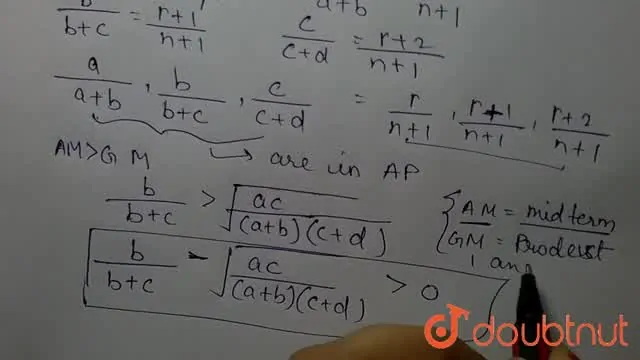If a,b,c,d be four consecutive coefficients in the binomial expansion of (1+x)n, then value of the expression ((bb+c)2−ac(a+b)(c+d)) (where x>0 and n∈N) is
positive
negative
zero
depends on n
The correct Answer is:A
(a) a=nCr−1, b=nCr, c=nCr+1, d=nCr+2
a+b=n+1Cr
b+c=n+1Cr+1
c+d=n+1Cr+2
a+ba=n+1r
⇒aa+b=rn+1, bb+c=r+1n+1, cc+d=r+2n+1
∴aa+b, bb+c, cc+d are in A.P.
A.M.>G.M.
bb+c>√ac(a+b)(c+d)
⇒(bb+c)2−ac(a+b)(c+d)>0
Similar Questions
If a, b and c are three consecutive coefficients terms in the expansion of (1+x)n , then find n.
View SolutionIf a, b and c are three consecutive coefficients terms in the expansion of (1+x)n , then find n.
View SolutionLet a,b,c,d be the four consecutive coefficients of the binomial expansion (1+x)n On the basis of above information answer the following question: aa+b,bb+c,cc+d are in (A) A.P. (B) G.P. (C) H.P. (D) none of these
View SolutionIfC0,C1,C2..Cn denote the coefficients in the binomial expansion of (1+x)n, then C0+2.C1+3.C2+.(n+1)Cn
View Solutionif a,b,c and d are the coefficient of four consecutive terms in the expansion of (1+x)n then aa+b+cc+d=?
View SolutionIf the four consecutive coefficients in any binomial expansion be a, b, c, d, then prove that (i) a+ba,b+cb,c+dc are in H.P. (ii) (bc+ad)(b−c)=2(ac2−b2d)
View SolutionIf the four consecutive coefficients in any binomial expansion be a, b, c, d, then prove that (i) a+ba,b+cb,c+dc are in H.P. (ii) (bc+ad)(b−c)=2(ac2−b2d)
View SolutionIf C0,C1,C2,C3,...,Cn be binomial coefficients in the expansion of (1+x)n, then
Q. The value of the expression C0−2C1+3C2−....+(−1)n(n+1)Cn is equal toView SolutionIf a and b denote respectively the coefficients of xmand xn in the expansion of (1+x)m+n , then write the relation between a and b.
View SolutionIf A and B are coefficients of xn in the expansion of (1+x)2n and (1+x)2n−1 respectively, then find the value of AB.
View Solution


